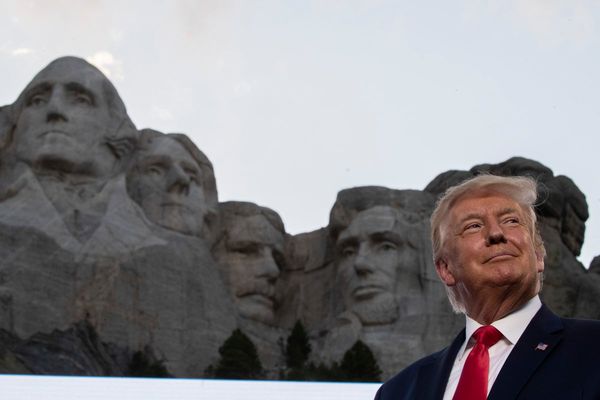
After months of shadow campaigning against the constitutionally entrenched Indigenous voice, we shouldn’t be surprised that the Liberal party has formalised its opposition.
And yet it is still breathtaking to see, just days after another emphatic rejection of the Liberals – this time in the once-in-a-century byelection defeat in Aston.
On Saturday evening, Peter Dutton said he would have to “distil” the message of the electorate and the views in his party, including those on the right “unhappy that we have not made a decision on the voice” and “those on the left upset about different policies”.
There are many lessons from Aston, which was not a referendum on the voice, but on this one policy area the fact it took just four days to distil a position in favour of a lurch to the right is a bad sign that none of them will be learned.
On Sunday, Dutton appeared on the ABC’s Insiders, prepared to accept that he had failed the electoral test but no better able to say what the party may need to change now that its long slide in popularity in metro areas has continued.
On Tuesday, Dutton appeared alongside his deputy, Sussan Ley, in front of a bed of flowers at an Albury nursery, sporting glasses and a soft blue-grey houndstooth jacket, looking more like a genial academic than a former Queensland cop.
Dutton struck some new notes, boasting about how Australia had the “highest uptake of solar per capita anywhere in the world” thanks to Liberal-National government, and that “there are many things [where] we’ve been able to support the government”.
The gentler Dutton, able to take his own advice during the 2018 leadership challenge against Malcolm Turnbull that the electorate might like to see him “smile and maybe show a different side”, didn’t last long.
By Wednesday Dutton was back in Canberra, shepherding a proposal to oppose constitutional entrenchment of the Indigenous voice to parliament, as called for by the Uluru statement from the heart, through shadow cabinet and the Liberal party room.
The only thing Dutton seems to have learned is to attempt to knock off the hard edges of his “no” with spin that the Liberal position is a “yes to constitutional recognition” (symbolic only), and “yes to local and regional voices”. This is lipstick on a pig.
Dutton’s “no to the prime minister’s Canberra voice” is a decision to turn his back on the Uluru statement and Labor’s offer of bipartisanship in a bid to tank the referendum and personalise Liberal attacks against Anthony Albanese.
Dutton said that “respectful debate” was needed in the same press conference he quoted one Indigenous aunty deriding the likely members of a national voice as “24 academics”.
The opposition leader repeatedly claimed, without evidence and after multiple public statements to the contrary by Mark Dreyfus, that both the attorney general and solicitor general had advised against allowing the voice to have input to the executive.
Perhaps the ability for backbenchers to campaign and vote according to their conscience will allow Dutton to present what is a hard no as some kind of middle of the road peace deal.
But that’s of limited comfort.
The Liberal MP Bridget Archer, who has crossed the floor on everything from emissions reduction targets to the government’s housing bill, said the decision on the voice had tested her “faith in the Liberal party”.
“Backbenchers [are] always free to do as they wish, allegedly anyway,” Archer told Guardian Australia.
Another MP noted that the theoretical freedom is hard to exercise in practice – “not if they want a happy future”.
The road ahead will be hard: hard for a government to pass a referendum without bipartisan support, and hard for moderate Liberals to campaign in favour against the overwhelming weight of the conservative faction opposed.
But regardless of the success or otherwise of the referendum, Dutton is now locked in as a Tony Abbott-style opposition leader, a hardman who cannot find another register that even approximates national leadership.







